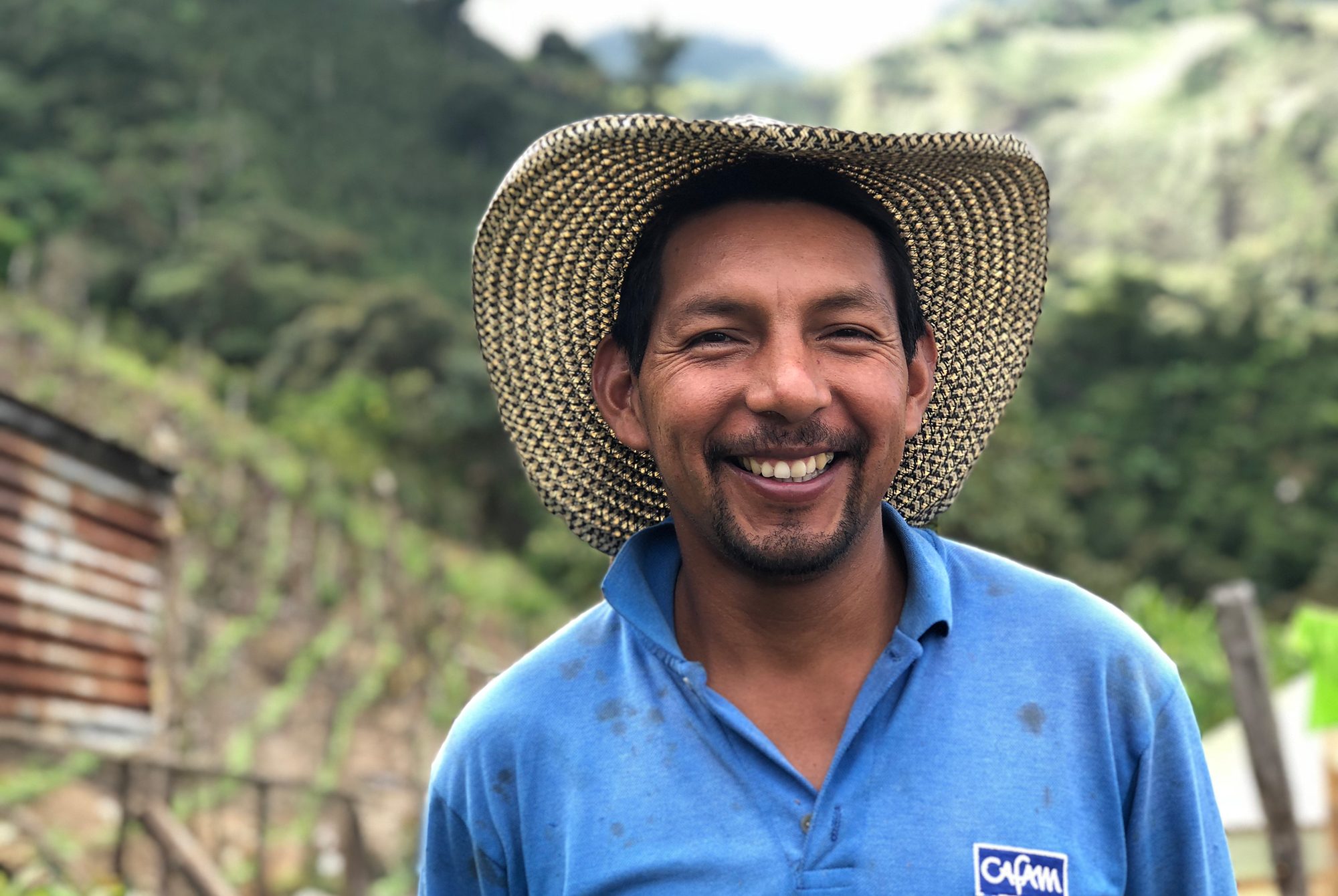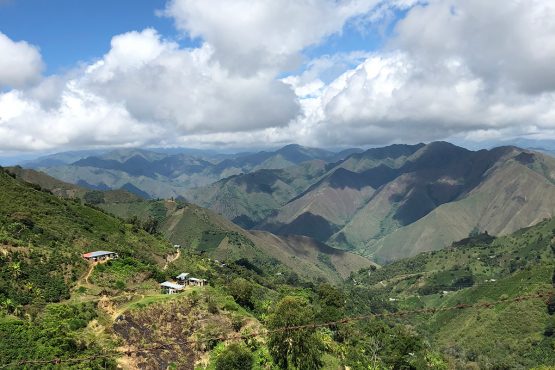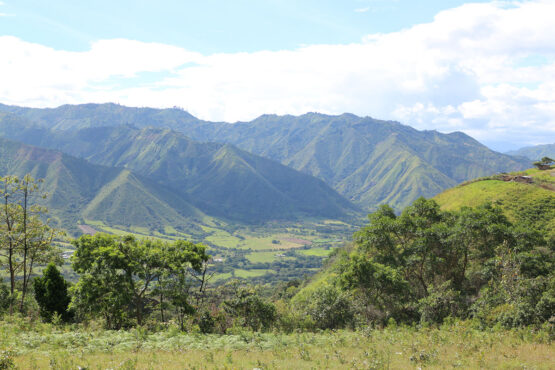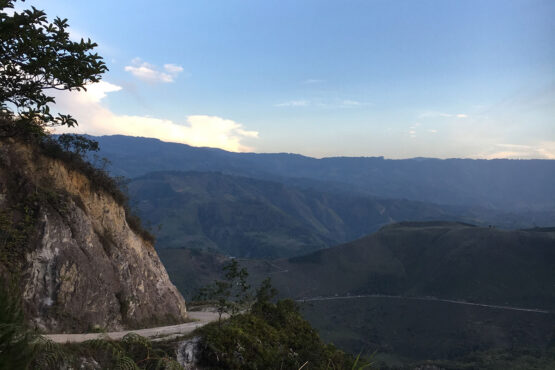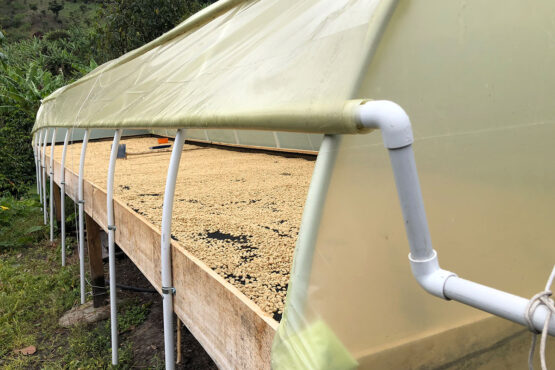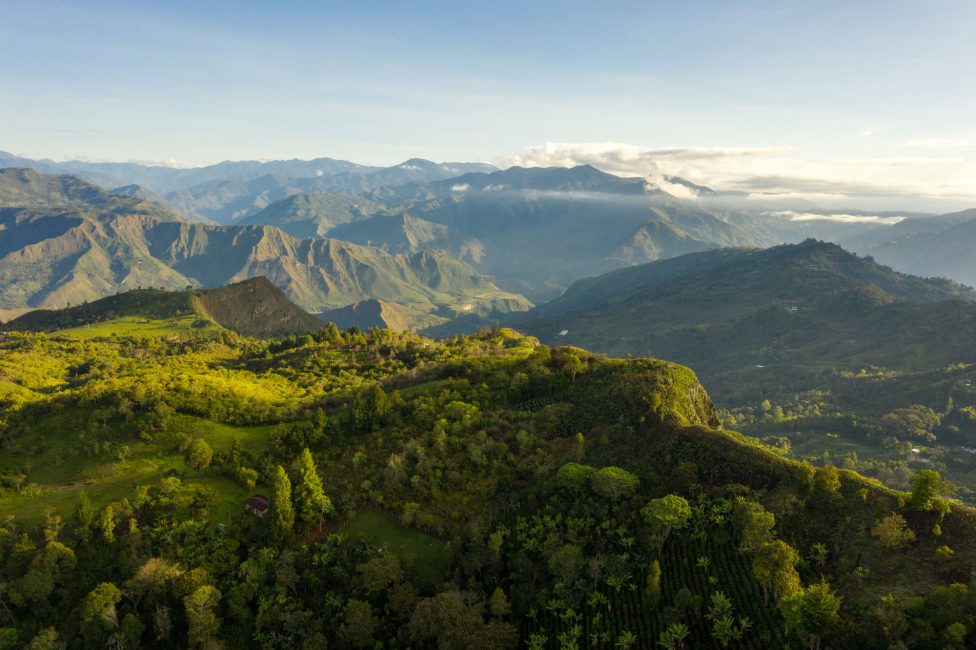El Guayabo
Elegant and lifted, with good structure and clarity. Vanilla florals, with nectarine, greengage plum and mango in the cup.
This coffee was produced by Raul Hector Trujillo (pictured above) on his small farm, El Guayabo, located near the town of San Francisco Alto, in the municipality of La Plata in the state of Huila, in Colombia’s south.
El Guayabo is a small farm, – just 2 hectares in size – located at 2,000m above sea level, in the steep, rugged hills that surround San Francisco Alto. Raul lives on the farm with his wife, two sons and young daughter, where they sit at the very top of the region, with an incredible view of the Paez river valley below.
Although Raul Héctor is now a leader of a quality-focused group of growers in San Francisco Alto, he was barely making ends meet when sourcing partners Pergamino first started working with him five years ago. Since joining their Allied Producer Program, Raul has been selling his production as specialty coffee, earning a steady and high premiums throughout this time.
This added income has allowed him and his family to make improvements to their farm and home, as they have been able to upgrade their bathrooms and kitchen (something the family is very proud of!). Slowly but surely, Raul has also planted more coffee trees in uncultivated plots of the farm, and is currently saving to be able to increase the capacity of his wet mill.
ABOUT LA PLATA
The municipality of La Plata has a long history of coffee-growing and agriculture. Along with coffee, the region is known for growing rice, plantain and cacao and for its rich biodiversity. For decades, the centre of town has served as the hub for the local coffee cherry market, as farmers from nearby Inza, Paez and Rio Chiquito (all around 90-minute drives away) would sell their crop here to domestic coffee traders. Recognising the benefits of having a strong presence in town, our friends at Pergamino (our supply partners in Colombia) established a collection point in La Plata and began investing in and training farmers in the municipality and nearby towns.
Today, operations at La Plata are managed by Felipe Henao, whose brother Leonardo is the Head of Quality Control and Logistics at Pergamino. Felipe has spent many years being Pergamino’s “boots on the ground,” giving him the opportunity to learn the intricacies of the different growing regions. By working side-by-side with many producers, Felipe has also been able to establish meaningful, long-term relationships across the Colombian countryside. This experience made him the ideal point person at La Plata, as the role requires him to be in constant communication with Pergamino’s HQ in Medellin, while making complex purchasing decisions and handling logistics on the field.
This is the second time we have sourced coffee from this community, but we are incredibly excited about its potential. The team at Pergamino tell us the region is difficult to reach, as the hills are sharp and the highway that leads to the centre of town becomes practically impossible to traverse during winter. Their efforts pay off on the cupping table though, as lots from this region consistently show a unique vibrancy and clarity.
ABOUT HUILA
The department of Huila is located in the southwest of Colombia. It is framed by the Central and Eastern ranges of the Andes, with most of it sitting in the Magdalena Valley. This region is renowned for the quality of its coffee, and in 2013 it received the Denomination of Origin status. Coffee production in Huila belongs to an ecosystem of subtropical, very humid mountain forest. The year-round distribution of rainfall, rich soil and temperature allow exceptional coffee to be cultivated at elevations of up to 1,900 meters above sea level almost throughout the whole year.
Huila is one of the largest coffee-producing regions in the country, however the size of coffee farms is overwhelmingly small-scale, with most farmers owning on average just 1.5 hectares of land. Alongside coffee they also grow rice, raise cattle, and farm fish.
Our export partners for this coffee, Pergamino, have worked hard commercialise specialty-grade coffee throughout Huila, and have uncovered some stunning coffees and very dedicated producers in the process. They work closely with the producers to give them feedback on their coffees (provided by Pergamino’s expert team of cuppers) and provide top up payments when the coffee is sold at a higher premium.
Head here to learn more about the work of Pergamino.
HOW THIS COFFEE WAS PROCESSED
This coffee was processed using the washed method at each farm’s ‘micro-beneficio’ (mill). After being pulped using a small manual or electric pulper, coffee is placed into a fermentation tank, where it can spend anywhere between 48 and 72 hours. Because of the cooler climate in San Francisco, contributing producers tend to ferment their coffees for longer than usual, and some will often blend two days’ worth of pickings over the fermentation period. Coffee is then washed using cold, clean water.
Once rinsed, the wet parchment was carefully dried (over 10–18 days) on a raised bed with plastic over the top which protects the coffee from the rain and prevent condensation dripping back onto the drying beans. This bed has adjustable walls to help with air flow, and temperature control to ensure the coffee can dry slowly and evenly.
Once dry, the coffee was delivered to Pergamino’s warehouse, where it was cupped and graded, and then rested in parchment until it was ready for export.
